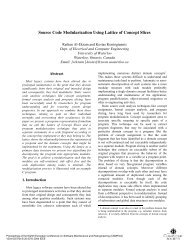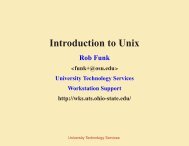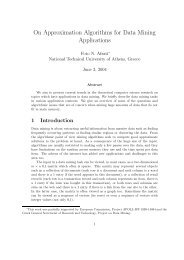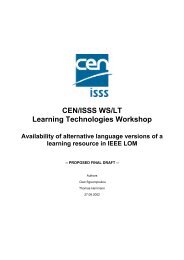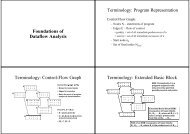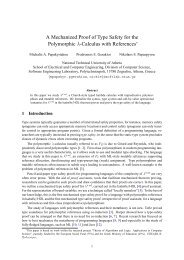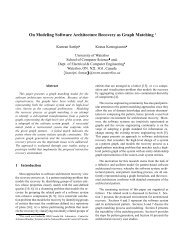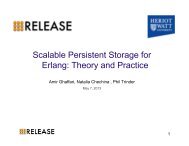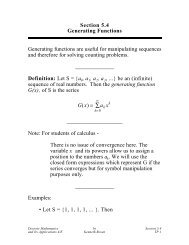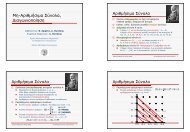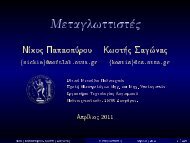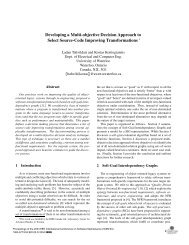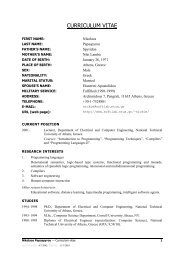Manual
Manual
Manual
You also want an ePaper? Increase the reach of your titles
YUMPU automatically turns print PDFs into web optimized ePapers that Google loves.
Chapter 10: C++ Language Interface 101<br />
10 C++ Language Interface<br />
10.1 C++ Parsers<br />
10.1.1 C++ Bison Interface<br />
The C++ parser LALR(1) skeleton is named ‘lalr1.cc’. To select it, you may either pass the<br />
option ‘--skeleton=lalr1.cc’ to Bison, or include the directive ‘%skeleton "lalr1.cc"’<br />
in the grammar preamble. When run, bison will create several entities in the ‘yy’ namespace.<br />
Use the ‘%name-prefix’ directive to change the namespace name, see Section 3.7.11<br />
[Decl Summary], page 59. The various classes are generated in the following files:<br />
‘position.hh’<br />
‘location.hh’<br />
The definition of the classes position and location, used for location tracking.<br />
See Section 10.1.3 [C++ Location Values], page 102.<br />
‘stack.hh’<br />
‘file.hh’<br />
‘file.cc’<br />
An auxiliary class stack used by the parser.<br />
(Assuming the extension of the input file was ‘.yy’.) The declaration and implementation<br />
of the C++ parser class. The basename and extension of these two<br />
files follow the same rules as with regular C parsers (see Chapter 9 [Invocation],<br />
page 97).<br />
The header is mandatory; you must either pass ‘-d’/‘--defines’ to bison, or<br />
use the ‘%defines’ directive.<br />
All these files are documented using Doxygen; run doxygen for a complete and accurate<br />
documentation.<br />
10.1.2 C++ Semantic Values<br />
The %union directive works as for C, see Section 3.7.4 [The Collection of Value Types],<br />
page 55. In particular it produces a genuine union 1 , which have a few specific features in<br />
C++.<br />
− The type YYSTYPE is defined but its use is discouraged: rather you should refer to the<br />
parser’s encapsulated type yy::parser::semantic_type.<br />
− Non POD (Plain Old Data) types cannot be used. C++ forbids any instance of classes<br />
with constructors in unions: only pointers to such objects are allowed.<br />
Because objects have to be stored via pointers, memory is not reclaimed automatically:<br />
using the %destructor directive is the only means to avoid leaks. See Section 3.7.7 [Freeing<br />
Discarded Symbols], page 57.<br />
1 In the future techniques to allow complex types within pseudo-unions (similar to Boost variants) might<br />
be implemented to alleviate these issues.



